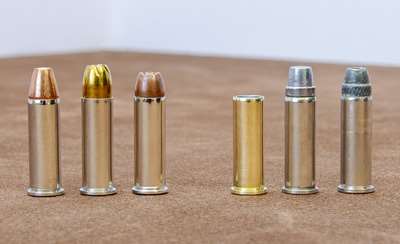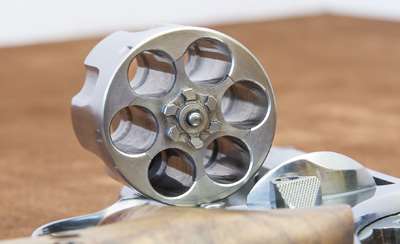Choose Stocks Wisely
Properly relieved stocks are critical to smooth speedloader function. Note that the HKS loader cannot get a straight shot at the cylinder with these grips.
There are a few things you can do to enhance the efficiency of your revolver when using speedloaders. The most critical is to ensure the stocks used are sufficiently relieved for clearance with the chosen speedloader. Surprisingly, a lot of revolvers meant for the self-defense market are equipped with grips/stocks that are incompatible with most speedloaders. The left stock panel must be relieved properly to allow the loader a straight shot into the chambers. Stock clearance needs to be sufficient with the longest loaded cartridges that will conceivably be used in the gun. If the panel is too proud in this area, it will push the loader outboard, resulting in the cartridges entering at an angle and binding up. Few things are more frustrating to a new revolver shooter than trying to make a speedloader work with ill-fitting stocks.
Ammo Matters

The solid copper bullet and jacketed hollow points on the left load much more easily from speedloaders than the sharp-edged lead wadcutter and semi-wadcutters on the right. Slippery nickel-plated cases help, too.
Along those lines, some thought should be given to the ammunition used for these applications. The shape and composition of the projectiles in loaded cartridges can have a dramatic effect on loading. Bullets with rounded ogives feed much better than do bullets with sharp shoulders. Bullets with gilded metal jackets or of solid copper construction are smoother than soft-lead bullets. This is not to say that lead wadcutters or semi-wadcutters aren’t terminally effective, but they’re better-suited for the initial load in the cylinder. If a reload is required, jacketed bullets make it easier to complete it without drama. Nickel-plated brass cases are more “slippery” than plain brass and should be chosen for speedloader use when possible; most rounds loaded for defensive purposes use nickel-plated cases, but it’s not a given.
One Custom Touch
It’s gratifying to see manufacturers starting to offer chamfered chambers on production guns. This is a simple modification that gunsmiths have been doing for serious revolver practitioners for decades. Breaking the 90-degree surface at the back edge of each chamber mouth with a shallow bevel makes sinking bullets into chambers noticeably easier. Taurus offers a chamfer on its Executive Series guns and S&W does likewise for the popular Lipsey’s Ultimate Carry revolvers. If I could recommend only one upgrade to a defensive revolver, this would be it. Chamber chamfering is inexpensive and can be performed by any reputable gunsmith.
Keep Them Clean

Chamfering the chambers on a revolver cylinder is a simple gunsmithing operation that pays huge dividends when using speedloaders.
Just keeping the chambers clean and free of carbon build-up will greatly aid rounds dropping in freely from loaders. This is especially important if the gun is chambered for a magnum round and practice is conducted with shorter “Special” cartridges. The carbon ring of the shorter cartridge will prevent the magnum-length cartridges from fully chambering if left untended. Keeping the area underneath the extractor star and the area of the breechface behind the cylinder free of carbon and debris will aid smooth function.
Read the full article here

